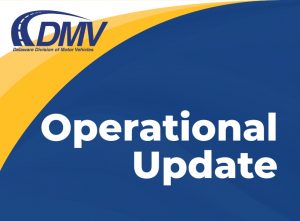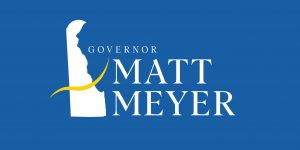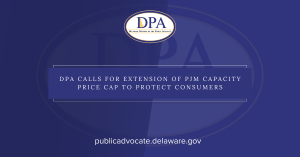Long-term plan addresses Delaware’s structural budget challenges
DOVER, Del. – Governor Carney on Thursday presented his plan to close a $385 million structural budget shortfall and balance the Fiscal Year 2018 state budget through an equal mix of budget reductions and new revenues.
Governor Carney’s budget proposal – combined with the plan to study long-term efficiencies and improvements through the Government Efficiency and Accountability Review Board (GEAR) – would contain long-term costs, rebalance Delaware’s revenue portfolio to respond to economic growth, and maintain key public investments.
Despite significant growth in mandatory costs in healthcare and education, Governor Carney’s budget would increase spending just 0.29 percent over the current year.
“We are presenting a balanced, long-term solution to Delaware’s structural budget challenges that will keep Delaware economically competitive,” said Governor Carney. “This proposal requires shared sacrifice – and that starts with a commitment by state government to operate more efficiently and spend taxpayer dollars wisely, while maintaining key investments in healthcare, education and our economy. I look forward to working with the General Assembly through June 30.”
“The budget framework presented on Thursday results in flat budget growth overall,” said Mike Jackson, Director of the Office of Management and Budget. “This proposal not only allows us to balance our budget in Fiscal Year 2018, but would address the persistent projected budget deficits that we have experienced the past several years.”
“The changes we have proposed would make Delaware’s revenue portfolio more responsive to Delaware’s economy, and reduce volatility in the annual budget process,” said Rick Geisenberger, Secretary of the Delaware Department of Finance. “This is a balanced plan that will put Delaware on a long-term, sustainable path, while maintaining competitiveness with surrounding states.”
Key portions of Governor Carney’s financial plan:
Making Government More Efficient
4.5 percent: Total reduction to state agency discretionary funds.
$6.5 million: Reduction to adjust cost share in employee health plans.
$5.0 million: Eliminate 200 vacant positions.
$3.5 million: Eliminate double state share.
Immediate Budget Reductions
$25 million to reduce funding for Open Space, Farmland and the Energy Efficiency Fund until resources are available.
$5 million to reduce the Senior Property Tax Credit by $100.
$3.3 million in higher education reductions.
$2.6 million to reduce Medicaid dental reimbursements by 14%.
$1.2 million in reductions for fleet services and energy expenditures.
$594,300 for a reduction to pass-through programs.
$460,800 to reduce funding for Delaware Art, and Library Standards.
$125,000 to close the Polly Drummond Hill Yard Waste site.
$171,000 to eliminate the Board of Parole.
Investing in Public Education
Preserving Core Investments:
$25.1 million for new teachers in Delaware classrooms.
$4.7 million to maintain investments in Early Childhood Education.
$1.0 million for Opportunity Grants for schools serving disadvantaged students.
Proposed Reductions:
$22 million reduction to Educational Sustainment Fund; Delaware school districts would receive flexibility to raise the match tax without referendum to cover reductions to the Sustainment Fund.
$15 million reduction to school district & charter school operations.
Key Investments
Promoting a Healthy Delaware
$11.8 million to fully fund Medicaid for low-income Delawareans, Delawareans with disabilities, and Delaware seniors for long-term care.
$1.0 million to add funding for substance abuse treatment services.
Access to Quality Housing
$4.0 million to maintain funding for affordable housing through the Housing Development Fund.
$3.0 million for the State Rental Assistance Program, which targets assistance for specific groups with a high need, such as Delawareans with disabilities, those aging out of foster care, and homeless veterans.
Addressing security in Delaware’s prisons
$4.5 million to increase hazardous duty pay for Delaware correctional officers.
$2.3 million for 75 new correctional officers at James T. Vaughn Correctional Center and Baylor Women’s Correctional Institution.
$1.3 million for new equipment and training for correctional officers.
Rebalancing Delaware’s Revenue Portfolio
Governor Carney’s proposal would build off recommendations from the bipartisan DEFAC Advisory Council on Revenues, rebalance Delaware’s revenue portfolio to be more responsive to economic growth, and reduce volatility while maintaining Delaware’s competitiveness with surrounding states.
Personal Income Tax:
Eliminate itemized deductions in Delaware and increase the standard deduction more than 50% Increase each tax bracket by 0.2 to 0.4 percentage points, with top rate rising to 6.8 percent. Increase the eligibility age for additional personal credits and retirement income exclusions from 60 to 65 in 1-year increments.
Effective: January 1, 2018
Revenue in Fiscal Year 2018: $64.6 million
Corporate Franchise Tax:
Create a second tier maximum tax at $250,000 for public companies with greater than $750M in revenue or assets and no less than $250M in revenue or assets. Increase the first tier maximum tax from $180,000 to $200,000 to reflect inflation since the last increase in 2009.
Make inflationary adjustments to miscellaneous filing fees.
Effective: January 1, 2017
Revenue in Fiscal Year 2018: $116.1 million
Tobacco Taxes:
Increase the tax on cigarettes from $1.60/pack to $2.60/pack.
Treat moist snuff and e-cigarettes as Other Tobacco Products (OTP).
Increase the tax on OTP from 15% of wholesale value to 30%.
Effective: August 1, 2017
Revenue in Fiscal year 2018: $16 million
###

















































































